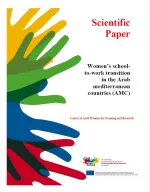Women’s school-to-work transition in the Arab mediterranean countries (AMC)

SAHWA Scientific Paper nº. 2
Youth inactivity - not being in education, employment or training (NEET) - is by far the highest in the Arab Region, especially among young women, and estimated at more than 40% of the youth. Young people NEETs are particularly vulnerable to social exclusion (Rosso 2012). Two recent events in the Region have had a serious negative impact on job creation: 1) continuous political instability following the so-called Arab Uprising; and 2) the slowdown in global growth subsequent to the 2008 economic crisis. The probability of being unemployed increases when a person is young, educated, urban, or female (OECD 2015).
On the other hand, the school-to-work transition mechanisms are failing as a result of decline in the educational system. Save for a few exceptions, findings of several studies and surveys suggests that the educational systems in the region do not offer students the set of skills that enable them to get a job and subsequently serve them well in their careers (AfDB 2015). Taking into consideration the higher recruiters’ demands, and stronger employers’ expectations, tougher competition for talent, global sourcing of knowledge workers, and an increasing mobility of graduates, universities and schools need to do a better job at preparing students for successful and fulfilling careers.
DOI: doi.org/10.24241/swsp.2017.2.1
E-ISSN: 2564-9183